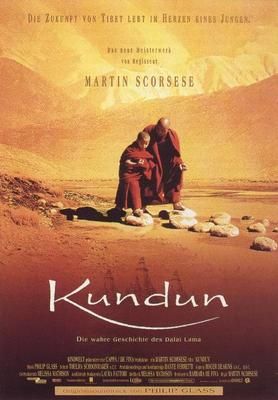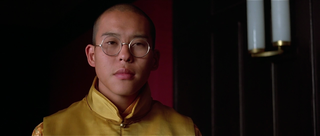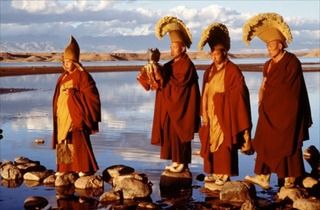
Kundun
1997
Director: Martin Scorsese
Starring: Tenzin Thuthob Tsarong
Kundun tells the story of the fourteenth Dalai Lama. Tibetans believe that the spirit of Buddah is reincarnated into the Dalai Lama, and after the death of the thirteenth, holy men are searching for the next spiritual and secular leader of the country. A young boy is found and taken to a monastery where he is trained in Buddhism. When he is older, the Dalai Lama (Tsarong plays the Dalai Lama as an adult) faces Chinese invasion and seizure of his country Tibet. He must decide whether to stay and stand up for his country or flee in the face of increasingly hostile Chinese gestures.
Having said all of that, there is shockingly little plot in this film. Things pick up when the tensions with China start to mount, but the first hour of the film, at least, is a large meandering episode with little to no focal point. I was interested but never entranced. I was following along, but not enthralled. I was never bored, either, but the film never got under my skin. Frankly, I have a bit of a problem with this. Scorsese clearly thinks he’s telling a gripping tale. He’s not. It does pick up when tensions with China begin to mount, but the opening half of the film is, quite simply put, vague. We are given no background about the traditions of Buddhism and the constant shuffling of the Dalai Lama’s teachers and mentors gets confusing.
Scorsese used nonprofessional actors for most of the roles in this film, and the product is a nicely understated and low key film, at least from the vantage point of performances. No one ever gets incredibly angry or upset, there is no overacting or mugging for the camera, and doesn’t that seem to fit perfectly for the Dalai Lama? In terms of performances, there is a very even keel throughout the film. Few ups, few downs, with everything staying nicely in the middle of the road. That might sound a little boring, but it is very reflective of the persona of the Dalai Lama himself. Modesty and inward meditation are more important than outward shows of wailing and passion.

The biggest problem I have with the performances is not something the individual actors could have fixed, but rather stems from an incredibly poor directorial choice of Scorsese. The movie is in English. These Asian nonprofessional actors, many of whom are Tibetan, are speaking English. If ever a film needed to be in Tibetan, this is that movie. Why, Marty, WHY did you insist on this being in English? I could tell how uncomfortable some of the actors were with the language, especially those portraying the Dalai Lama as a young child. I desperately wanted this movie to be subtitled; a strange wish indeed, but the clunky English completely took me out of the film, time and time again. If you are trying to tell a story that is totally and utterly Tibetan in nature, why the hell would you divorce it from its native language? I cannot in any way justify the choice to film in English, other than Marty being somewhat selfish and wanting to understand what the actors were saying. Which is Scorsese’s problem, NOT the actors’.
The script for Kundun was written by Melissa Mathison from a series of interviews she was granted with the actual Dalai Lama. I mention this because that makes the script essentially an autobiography or, at least, a series of memoirs. This gives the film a frame of reference for me. Understanding that it is meant to follow the Dalai Lama’s recollections, I can slightly forgive the meandering nature of the opening half. When one reminisces, you hardly do it in a straightforward, linear nature. Furthermore, understanding that the script was generated from the words of the Dalai Lama himself, the spirituality and the otherworldliness of the man starts to make sense. The film treats him as mystical, something that I am certain Tibetans believe. In terms of a biopic, however, this treatment does not mesh well. How on earth can a small boy be the reincarnation of a god? Troubling. BUT, if I remember that this film comes from the mouth of that reincarnated god himself, I begin to understand the overly spiritual depiction. I will say, however, that I wanted to see more of the Dalai Lama’s struggle to accept his mantle. Did a young boy of no more than three really willingly give up everything he knew, including his childhood, in order to devote his life to his country? Even in terms of an autobiography, I doubt the lack of doubt. There must have been some sort of conflict upon the way. There is not. This makes for very dull storytelling.

So the story is a little lacking. So why would you watch this? Short answer: the cinematography, costumes, and score. This is a breathtakingly gorgeous film. The costumes are amazing. The setting is stunning. Point blank, this is a very beautiful film to look at. It was shot almost entirely in Morocco, clearly not getting the rights from China to shoot on location. The music, by Philip Glass in his typical menacing minimalist way, is bizarrely fitting. The score lends the film a sad tone, even from the very beginning during the discovery of the Dalai Lama. That melancholy increases throughout the film to its inevitable conclusion, and I will say that I feel the score does more to guide the emotional arc of the story than the story itself. But because this is Philip Glass music, I don’t think that’s a bad thing.
Ultimately, my ruling for Kundun comes down as this: vanity project for Scorsese. It does not provide deep insight into the Dalai Lama. It does not provide profound commentary on Tibetan-Chinese relations. It does, however, smack of a filmmaker trying to make an “important” film.
Arbitrary Rating: 6/10. Worth checking out for the visuals and score.
My issue with this film is that it essentially suggests that everything found in Buddhism is fact--the signs and portents, rebirth, supernatural powers, etc. I don't mind the story, but I object to the trappings.
ReplyDeleteAny film that essentially says, "This is 100% factual, and look! Magic!" bothers me.
I can see that being problematic. It wasn't for me, but I think part of the reason it wasn't an issue is that I didn't really see any magic IN it; well, it might have been labeled "magic," but I simply read it as coincidence. People kept on talking about him being mystical, but he didn't raise anyone from the dead or anything. I mean, there was that oracle dude; that was a tough buy, but I just took it as a crazy person.
DeleteI guess what I am trying, so awkwardly, to say is that while everyone else talked about him as magical, I still saw him as a regular man.
really well written review!!!!!!!!!
ReplyDelete